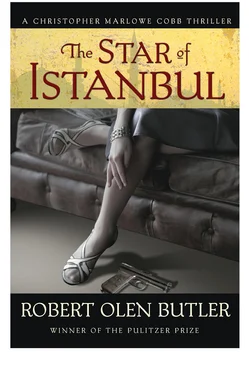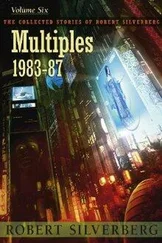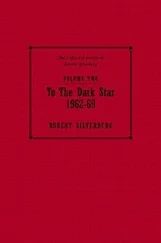As soon as I’d unpacked, I stood before the mirror hanging over my washbasin and I confronted my face, which was now recognizable to my adversaries. When I looked at men’s faces, tried to assess them as men, the first thing I often noticed was whether they’d been seriously struck by some other guy. I’d been struck. There were some old fighting scuffs here and there. But I’d been lucky never to have my nose rearranged. It was still on the straight and narrow, my nose. And my eyes were pretty clear. Dark as Chicago street tar but clear and steady. Over the left one was a white wisp of a scar the length of the last joint on my thumb, from a bit of tumbling shrapnel in my first real war, in Nicaragua, and mighty lucky I was for it to have just grazed on past.
As I took stock of my own mug, the principle of disguise that was running in my head was Keep it simple . Still, the change needed to be striking. If I was to learn anything else in London, I’d have to risk being seen, at least from afar, by people who knew me.
The beard was clearly the thing to change. I kept it pretty tightly cropped, but it definitely registered to the eye. So the beard I’d taken a shine to at breakfast wouldn’t work; it wouldn’t be enough. Especially from a distance, I’d pretty much be the same man. This one had to go.
I stropped my new razor — bought this morning, and I was glad it was at its sharpest — and I lathered up heavily and I shaved. I did my right cheek first, the easy one, the one I’d always known. Then I did my left cheek, carefully working my way down and up and around until all that remained, traced vividly white by the last of the lather, was the thing that prompted the beard in the first place.
I bent to the basin and rinsed away the heavily stubble-freighted shaving cream from the sink and I silently thanked the Arundel, as it had hot running water even at this hour. I soaked a hand towel in water as hot as I could stand it and wrapped my face from the eyes down. I soaked up the warmth and rubbed both cheeks clean and brought the towel down.
I was prepared for this, but it had been months since I’d faced this man, and I admit my breath clamped tight shut, from chest to throat.
I confronted my familiar, hairless face, but on one cheek was that long Turkish scimitar of a scar, a thing that I knew was there but saw now with a shock, like visiting a childhood memory I’d previously thought was pleasant and now realized had been full of pain.
But this hadn’t been child’s play, the crossing of swords with another German out to do no good.
And this benefit had come from it: the thing looked exactly like a German collegiate dueling scar. Intentionally so, as a matter of fact. And it was real, my own personal Schmiss.
The riots in the East End suggested the danger of assuming this identity in London. But I had a solution for that.
I used the room telephone to call for a bellhop to run an errand to a nearby chemist shop and I soon had a roll of gauze and a cloth arm sling, and he was a good boy, this cockney bellhop, as he had to go to another shop to find me the fritz-handled cane I’d asked for, with a hardwood shaft and an iron tip. He also brought a jar of cold cream and a bottle of alcohol and a bottle of spirit gum, which I knew from my theater days would be easier than straight collodion to put the dressing on my cheek and to take it off.
I stood once again before the mirror, having cut some thick squares of gauze to cover the scar. With the cane and the arm sling I would look like the sort of man who was beginning to appear in the streets of London: a wounded soldier, bad enough off to be mustered out. That would be conveyed with the limp and the arm.
I opened the bottle of spirit gum.
And instantly I understood that trace of a smell in my room at the Waldorf. Spirit gum. Of course. It had been a decade since I’d used it. That last time was to affix a stage mustache and muttonchops. The smell in the room was spirit gum.
I could not imagine why.
Someone himself in disguise. With fake facial hair.
Again: why? The Germans could send any mug to search a room. Any mug with his own mug that he could show in public.
I had no answer for now, but I knew I was not as lucky as that hypothetical mug; I could not show my actual self.
I brushed the spirit gum onto my face and applied the gauze. I changed into my second suit of clothes, a blue serge. I put my left arm into a sling and hobbled out on my cane into the street. I stepped into a taxi — using an upper-class British accent — and I made for the address Metcalf gave me for Brauer. He had a bachelor flat at number 70 Jermyn Street, between St. James Square and Green Park. I had the taxi driver drop me half a block east of Brauer’s building, an odd-looking, seven-floor corner affair with both a gable and a turret sitting pretty much side by side.
I got out of the taxi as quickly as I could in keeping with my new disability and I paid the driver. As I was about to walk away, he called me back to him, “Gov’nor,” he said, and I turned. He pulled off his cap and nodded at my arm. “Thank you for your service,” he said.
“We’ll kick their bloody asses,” I said, maintaining my upper-crusty accent. This made his head snap in surprise, and then he lifted his face and laughed.
Which was a good exit line for a good performance and I hobbled off on my cane before he could say any more. Only then did I realize that by cursing with him like a pal — sincerely so, Chicago-style — I’d given him a better feeling about the swells of this country than the swells deserved.
I moved along west, and the taxi went past me with the driver giving me a respectful nod, which I ignored in order to start bringing him back to the class reality of his bloody country.
I crossed Jermyn Street to the north side at Brauer’s corner, with Bury Street dead ending there. A couple of doors farther west was a pub, Hotspur, opposite the entrance to these bachelor flats, which had an engraved sign on the lintel: marlborough chambers.
I entered the bar and sat at a table at the front window. It was still early and slow in the place. I figured I might be here a long time. The delivery wasn’t till eight tonight, about a half hour after sunset. But I didn’t know where Selene was and probably didn’t know where the meeting would be, now that I’d compromised the shop. So Brauer was my only link, and I was a little nervous that he might’ve gone out this morning and would stay out. I had to keep his door under surveillance for as much of the day as I could.
I nursed Black and Tans for hours, keeping to myself, ignoring the day drunks, and then the light was waning and then it was getting on toward half past seven o’clock and the darkness was washing over the building facades and I was seriously worried Brauer wasn’t in his bachelor flat at all but off somewhere and I’d completely lose the thread.
And then finally there he was, stepping out of the Marlborough Chambers and looking up and down the street. I guessed for a taxicab. I was glad he didn’t find one. If he’d caught an isolated taxi passing by, I’d have been hard pressed to get one to follow him. But he turned west and walked off.
I put some cash down and got up quick, belying the bum leg, if any of the guys at the bar were watching. But I was out the door and done with the pub and dotting the pavement with my cane in a quick trot as long as Brauer wasn’t looking my way.
Staying always on the opposite side of the street, I followed him along Jermyn and then north on St. James. He never once paused or looked back, never considering he might be followed. The next corner was Piccadilly, and as soon as he reached it, he stopped and looked to his left. For a taxi, I again presumed.
Читать дальше












